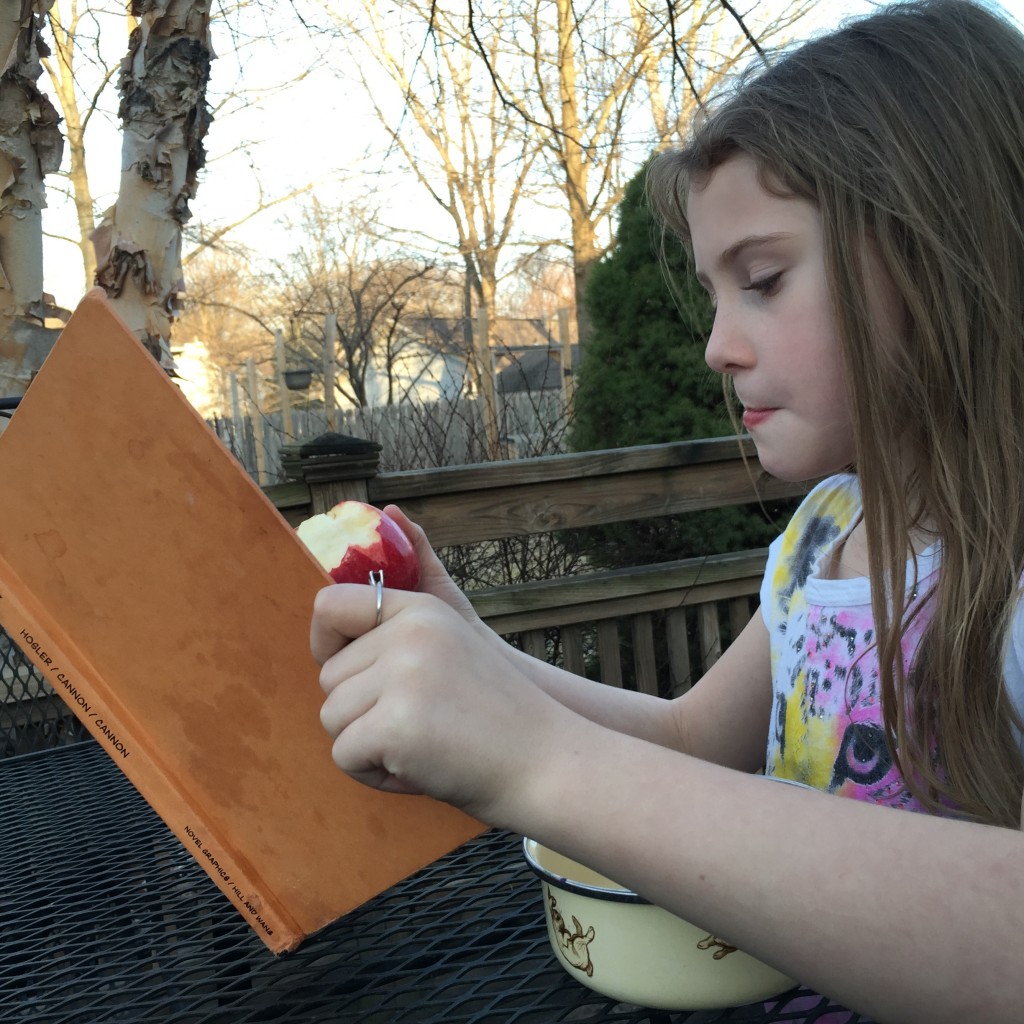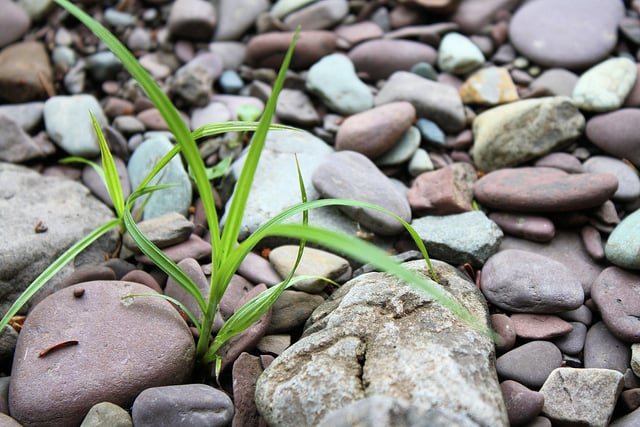Listen first
“Daddy, you know what… I think the first bite of an apple is always the best.”
~Delaney, age 9
I’ve said it before. We need kids to teach us how to see the world anew in all its beauty. If you’re not listening, you’re missing out. This alone could easily have been the impetus to write.

See the icky wear and tear on that book? After once again questioning her (I have asked at least 4-6 times on previous occasions) she says she honestly estimates that she’s read it approximately 18 times. I actually believe this. After a more typical back and forth on the differences between Anomalocaris and Pikaia, and a bit of silence that followed, she added: “Here’s a question I think about a lot… why are we even alive?
What works
The title of Delaney’s favorite book at this point in her life has clearly been “Evolution” by Hosler, Cannon & Cannon. There are a million reasons why this might be so. Included in these reasons are the facts that both Mom and Dad were upper level biology teachers for much of our lives, and that this book, among thousands of others, are titles that exist within our shelves at home. Beyond this, the answers are murkier. We never did ask her to read it. And yet, since age six, she has gone back time and time again to not only read it, but to talk about it… at the dinner table, on the deck during a 70 degree day in February, ad infinitum. Almost.
One could clearly and logically assume that the above interaction just “makes sense.” And it does. Children who grow up bathed in household discussions that revolve around the inner workings of the natural world might ask these questions. Yet, this leaves out a pretty crucial bit of the story. I would argue that the key element here is that over the past few years when she has had questions about the content of this book, she always finds one or two adults willing and able to carry on the conversation, and to poke and prod for further understanding and unanswered questions. This has led to a tapestry of questioning, understanding, reading, questioning, understanding, reading, etc. over a protracted bit of time.

The nerd stuff
Herein lies the key to deep understanding of some of the most profound discoveries of human history: it doesn’t happen in a “chapter,” a “unit,” or even the most carefully designed series of lessons in May just before culminating in state testing at the end of the year. There is a pretty clear reason we live in the most technologically advanced society in the history of the world, and yet we still have an electorate lacking even basic understanding of some of the key underpinnings of biology as we know it today. This is tough stuff. In the cacophony of tweets, Facebook posts of cats, Donald Trump election memes, competing state and national standards, and an externally-dictated, rapid-fire scope and sequence that pushes us to glaze over deep conceptual understanding… we miss it.
As a district administrator in academic services, I face a regular “Administrator Paradox,” as my former Superintendent, Todd White, referred to it. It is sometimes a “dual truth” that causes us to struggle with those things that lead to “performance” on regularly measured assessments of understanding vs. what we know to be a deeper truth on some level. I know the system needs to move along to achieve wins as agreed upon by state and national standards. Yet, I also know from a career of practice, that to achieve true conceptual understanding of the foundations of biology, we need longitudinal conversations with kids as they grapple with complex ideas at their own pace over time. We also need educators who understand this and are willing to adhere to external pressure, all the while staying true to what we know about children. And learning. And the struggles along the way.
We don’t face the same pressures at home. We don’t do benchmark assessments at home. We don’t do final exams. We don’t halt the conversations at agreed-upon artificial deadlines because we have to. As parents, we set up an overall ecosystem where learning can happen organically. We engage our children here and there and when they are ready. We don’t push when it isn’t necessary. We understand that the only true learning is that which is constructed in the minds of the little ones we are blessed to be near.
I struggle with this every day of my existence. As a school administrator, I am charged with fostering a program that delivers agreed-upon public measures of success. As a parent, I am free to act upon a lifetime of learning about learning. And as a thinking human being, I grapple with these dual truths. Not a single day goes by that I don’t try and try again to leverage my experience as a professional learner at home and at school to design the best system for our children. I listen long, and then act accordingly. I try to make the best of a complex understanding between what I can do and what I know should be.
In 2016, I know we need to break free from “third period;” from the Carnegie Unit. I know we need flexible systems that honor the fact that conceptual understanding doesn’t necessarily happen in a chapter or lesson, or even the most craftily-designed long-term unit. I know schools do not operate in a world apart from the learning that happens (or doesn’t) in our homes. Biology isn’t rocket science. It is messier.

It doesn’t get easier
Seventy degrees in February. On the deck. Eating tangerines and apples. A little kid trying to understand how all of the bits and pieces of the opera of life come together. Our Daddy-Daughter conversation tonight ultimately ended with a short back and forth resulting from this question:
“Here is a question I think about a lot… why are we even alive?”
The answer to this in my head is an essay. Many essays. I struggle to remember my responses to questions like this in the heat of the classroom. Tonight, however, I left it with a messy bit about how science doesn’t actually seek to answer the why of such things… but rather the how. That other schools of thought are best equipped to address the why. Religion. Spirituality. The interplay between the two, if you believe that exists, etc. My daughter and I had another in a long line of epic chats. As a science teacher, I understand the subtle differences between the scientific search for truth and other fundamental human quests for truth and understanding. Ultimately, I hope that in my lifetime we can find a way to ensure that as a system we understand these complex differences and their inherent challenges… but also that I’m guiding my little girls at home in the way they most deserve.
I know a bit of what works at home. I know a bit of what works at “school.” I wish the differences weren’t so stark. This is a paradox. Dual truths are apparent here. I wish for and commit to working toward a future where these two truths aren’t separated by an artificial wall of our own construction.
Artwork
*My iPhone photo of Delaney on the deck tonight. Eating an apple. Reading some science. Talking some science. Asking some big, fat “why?”
*Penrose triangle by Cabrera Photo via Creative Commons on Flickr
*Swimming hole – Evolve 2011 by sand_and_sky via Creative Commons on Flickr
Incredible post, Sean. In addition to my admiration of your girls and their curiosity, I appreciate how you’re encouraging their desire to learn… which, as you said, doesn’t necessarily happen in the time frame of a unit or lesson. It’s what I love most about teaching in an inquiry model, and why I would never go back to anything else. Kids learn how to ask questions, investigate, generate more questions… and then discover all over again. I wish every child had opportunities like this, both inside and outside of school. It’s my quest of sorts to fight for that. Again, incredible post. Thanks for sharing.
We really do have to fight for it, and it is a battle we don’t win once and for all. I’ve learning that it keeps coming back. Leaders come and go. Teachers come and go. Students and parents come and go. Each time we need to revisit those “advocacy recesses” in our brain that would go dormant without frequent visits. Like this blog. And the fact that I am replying to you almost one year later. #notwinning 😉
Thanks for the post. So what was the conclusion of tonight’s discussion?
And, I feel this paradox or tension in teaching and even more now as my son is in kindergarten. There has to be some fundamental shifts that can mitigate this, right? Can a system slow down enough, develop expert-enough teachers, and be long-term thinking enough to pull it off?
I have to think that it is at least possible to provide rich learning and thinking opportunities at the school and classroom level, even if districts and states are trapped by cultural and policy expectations.
The conclusion is that you never really “conclude” a discussion like that one. You go back to it and update it time and time again after subsequent experiences. And we know this is exactly what is needed to build deep understanding of complex concepts into our very being. We know that, and still we rarely design for it in formal settings. It seems that the bigger the system, the less patient the design and assessment framework becomes.
I do know what you mean by slowing down enough to develop these rich skills in all of our educators. I do not know if that is possible at such a scale. However, I would say that I’m OK if my girls don’t have the deep, exploratory, inquiry-minded approach across the entire system. As long as there are opportunities for this sort of learning along the way… I think they will be better for it. And better self-regulating learners. Perhaps having students able to see the dynamic between vastly different approaches to learning helps them to be an advocate for the sort of experiences that work for them?
First off, I think it is great that you have a household that fosters such deep and insightful thinking on your daughters behalf. As a future educator, students like her really add to the dynamic and overall conversation in a classroom! I also couldn’t agree more about the point you raise that people just “miss” really key concepts of biology and life in general in this technological age, something that is truly astonishing. It really is sad, honestly. The point you bring up about learning at home is intriguing too. Learning does not stop in the classroom, but how do we go about scaffolding our kids with science, math, history, and life in general outside of the classroom. especially as they are growing up in an age like today? There certainly isn’t a definite answer to this, but the paradox between what works at home and school definitely provides for a great debate.
Also, it is great to see your daughter reading an ACTUAL BOOK, something that could even be considered “old fashioned” in this day and age. The fact that she just started reading it on her own is great as well. It’s awesome to see kids engaged in learning like this these days!
“…how do we go about scaffolding our kids with science, math, history, and life in general outside of the classroom. especially as they are growing up in an age like today? There certainly isn’t a definite answer to this, but the paradox between what works at home and school definitely provides for a great debate.”
Yeah. Exactly.
Greetings, Carlos. Thanks for stopping by to connect.
For me to be able to take any action on this (really great) question, I have to reframe it somewhat. We cannot control the learning lives of our students at home. We cannot dictate the levels of attention and support paid to our students when they are away from us. But what can we do beyond the four walls of our “schools?” What can we do to bridge the gap for individual students as they move back into the “home” environment?
I think it goes back to what we ask of kids away from school. I think an (not the) answer is to carefully consider what we mean by “homework.” It always goes back to design questions and issues for me. How can I give students something to think about between now and the next time we see one another? How can I design authentic and relevant “tasks” or “mini-challenges” or (I have so many ideas here) or…..
Crucial questions I would ask every single day of the school year: What are my students thinking about today? How do I know? How will they show me? How will they relate it to others? Who are “the others?” How will I help them along? Can I predict the misconceptions they might have along the way? Can I design little interventions for when those occur?
For me, learning must be conversational. I tend to always view it in terms of “Who is doing the talking? What are they saying? Who are they saying it to? What should happen as a result of this transaction? Are they opening reflecting on their conceptual understanding of “it?” How will I react to what they say? How can I help others to want to interact with them? Etc……
Sorry to ramble on, but I suppose that is what one good question does for me, and why I value them so much. I am heading now to a staff holiday party and I must go. Cheers to you and thanks again!